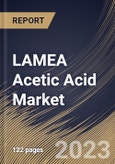Carbonylation of methanol is the predominant production method, particularly the Monsanto and Cativa procedures. Businesses constantly refine these technologies to increase efficacy and reduce costs. There's an increasing interest in producing acetic acid from renewable sources. Companies that invest in bio-based processes may acquire a competitive advantage, particularly if they can achieve cost-effective production at a commercial scale. Some significant actors are vertically integrated, producing methanol (an essential primary material) and acetic acid. This integration gives them a competitive advantage regarding supply chain stability and cost. Companies frequently engage in joint ventures and partnerships to boost their production capacities, enter new markets, and share technological know-how. Such alliances can affect the dynamics of competition.
Tariffs and trade barriers can impact the competitive landscape, mainly regional imports and exports. Additionally, the competition is influenced by the needs of end-use industries. The expansion or contraction of sectors such as textiles, plastics, adhesives, and food and beverages can affect the competitive landscape. Companies that invest in R&D to discover novel acetic acid uses or create more efficient production processes can acquire a competitive advantage. There are established titans in the market, and the competition is intense, driven by technological advances, cost efficiencies, and the fluctuating needs of end-use industries.
The Latin American market holds significant potential, shaped by the region's diverse industrial needs and evolving economic landscapes. Historically, Latin America's involvement in the market has been predominantly driven by its robust agricultural sector and resulting food and beverage industry demand. Countries like Brazil, Argentina, and Mexico, with their rich agrarian traditions, have spurred demand for acetic acid, especially for its applications in food preservation and as a key ingredient in vinegar production. Therefore, strategic collaborations, technological innovations, and diversifying end-use applications will present numerous opportunities for stakeholders in the region's market in the coming years.
The Brazil market dominated the LAMEA Acetic Acid Market by Country in 2022, and would continue to be a dominant market till 2030; thereby, achieving a market value of $772.3 million by 2029. The Argentina market is estimated to grow at a CAGR of 4.3% during (2023-2030). Additionally, The UAE market would exhibit a CAGR of 6% during (2023-2030).
Based on Type, the market is segmented into Vinyl Acetate Monomer, Acetic Anhydride, Acetate Esters, Purified Terephthalic Acid, Ethanol, and Others. Based on countries, the market is segmented into Brazil, Argentina, UAE, Saudi Arabia, South Africa, Egypt, and Rest of LAMEA.
The market research report covers the analysis of key stake holders of the market. Key companies profiled in the report include Eastman Chemical Company, Celanese Corporation, The Dow Chemical Company (Dow Corning Ltd.), Indian Oil Corporation Ltd., Gujarat Narmada Valley Fertilizers & Chemicals Limited, Daicel Corporation, Airedale Chemical Holdings Limited, Helm AG, SABIC (Saudi Arabian Oil Company), and LyondellBasell Industries Holdings B.V.
Scope of the Study
By Type (Volume, Kilo Tonnes, USD Million, 2019-2030)
- Vinyl Acetate Monomer
- Acetic Anhydride
- Acetate Esters
- Purified Terephthalic Acid
- Ethanol
- Others
By Country (Volume, Kilo Tonnes, USD Million, 2019-2030)
- Brazil
- Argentina
- UAE
- Saudi Arabia
- South Africa
- Egypt
- Rest of LAMEA
Key Market Players
List of Companies Profiled in the Report:
- Eastman Chemical Company
- Celanese Corporation
- The Dow Chemical Company (Dow Corning Ltd.)
- Indian Oil Corporation Ltd.
- Gujarat Narmada Valley Fertilizers & Chemicals Limited
- Daicel Corporation
- Airedale Chemical Holdings Limited
- Helm AG
- SABIC (Saudi Arabian Oil Company)
- LyondellBasell Industries Holdings B.V.
Unique Offerings
- Exhaustive coverage
- The highest number of Market tables and figures
- Subscription-based model available
- Guaranteed best price
- Assured post sales research support with 10% customization free
Table of Contents
Companies Mentioned
- Eastman Chemical Company
- Celanese Corporation
- The Dow Chemical Company (Dow Corning Ltd.)
- Indian Oil Corporation Ltd.
- Gujarat Narmada Valley Fertilizers & Chemicals Limited
- Daicel Corporation
- Airedale Chemical Holdings Limited
- Helm AG
- SABIC (Saudi Arabian Oil Company)
- LyondellBasell Industries Holdings B.V.








